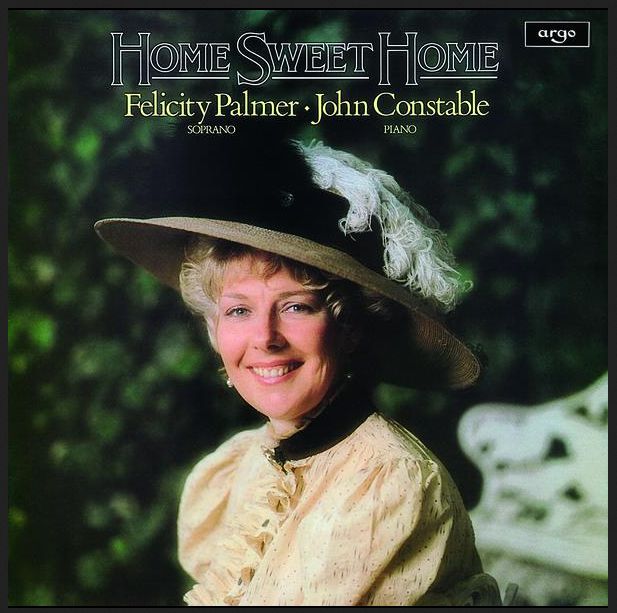

|
Dame Felicity Palmer has had a career spanning some four decades, firstly as a concert soprano and, during the 1980s, as an operatic mezzo-soprano. Her early work included a wide variety of repertoire, from baroque music with Sir Roger Norrington, Sir John Eliot Gardiner and concerts and recordings with Nikolaus Harnoncourt, to contemporary works with the London Sinfonietta and David Atherton and work with Pierre Boulez, with whom she recorded and toured Messiaen’s Poèmes pour Mi with the BBC Symphony Orchestra. She met the composer when she later performed the same work with the Los Angeles Philharmonic and Zubin Mehta. During her soprano years she made a tour of Australia for the ABC and worked, among others, with Sir Simon Rattle, Sir Colin Davis, Rozhdestvensky (Shostakovich Symphony No.14, and The Trojans at the BBC Proms), Raymond Leppard (recording of Messiah), Sir Charles Mackerras (recording of Judas Maccabaeus for DGG, concert performances and the BBC Proms) as well as concerts with all the major London orchestras, the New York Philharmonic and the LA Philharmonic. Recital work formed a key part of those years: with Geoffrey Parsons, Graham Johnson and the Songmaker’s Almanac, Roger Vignoles, Malcolm Martineau, Julius Drake and a great deal with John Constable, who, after a Queen Elizabeth Hall concert early on, played for three French song records for Argo Records and two Victorian ballads. Becoming a mezzo-soprano led to operatic engagements, which soon included regular appearances at Glyndebourne, the Royal Opera House (including Sweeney Todd and Elektra), her debut at the Metropolitan Opera, New York, in Wagner’s Ring Cycle with James Levine and many subsequent appearances; Das Rheingold and Die Walküre in Munich with Mehta, Dialogues des Carmélites with Riccardo Muti at La Scala and with Michel Plasson in Zurich and Toulouse, as well as work in Amsterdam, Chicago [details in the box below], San Francisco, Paris and English National Opera in London. Dame Felicity has recorded Klytemnestra in Elektra with the
WDR Symphony Orchestra Cologne and Semyon Bychkov, and recently,
two concerts of the same opera were recorded for the London Symphony
Orchestra label with Valery
Gergiev at the helm. [She is shown in the photo below
in a performance with the BBC Symphony Orchestra at the Proms in 2014, with
Christine Goerke as Elektra, led by Bychkov.] There is also a
recording of Dialogues des Carmélites with ENO and
Paul Daniel.
Dame Felicity’s recent engagements include Klytemnestra in Elektra with Bychkov at the BBC Proms, Geneviève in Pelléas et Mélisande with the Philharmonia Orchestra and Esa-Pekka Salonen, a return to English National Opera for The Countess in The Queen of Spades, Mrs. Sedley in Peter Grimes for Zurich Opera, English National Opera and with the Accademia Nazionale di Santa Cecilia conducted by Antonio Pappano, Dialogues des Carmélites at the Metropolitan Opera and at the Bayerische Staatsoper, and Mrs. Peachum in The Threepenny Opera with the London Philharmonic Orchestra under the baton of Vladimir Jurowski. She was made a CBE in 1993 and a Dame of the British Empire in 2011. == Names which are links in this box and below
refer to my interviews elsewhere on my website. BD
|
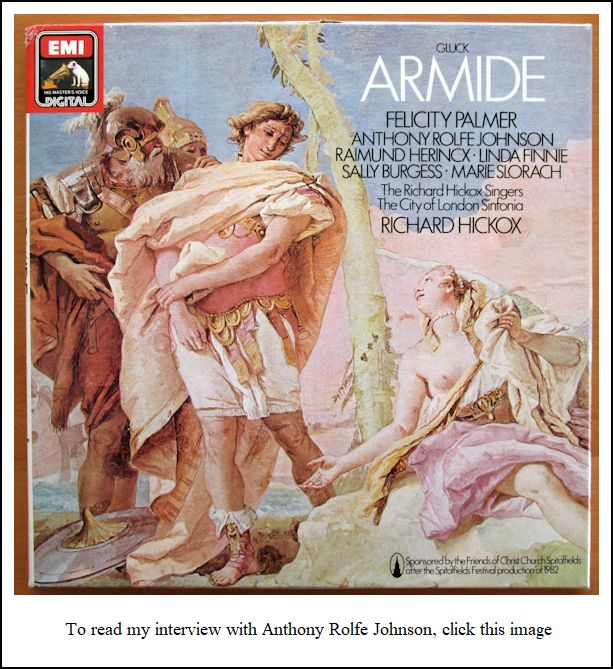 Felicity Palmer:
I can’t even offer you a biscuit, what you call
a cookie. I’m sorry. I’m trying to avoid
the temptation of having biscuits or anything, so I
have nothing here except cottage cheese to offer you.
Felicity Palmer:
I can’t even offer you a biscuit, what you call
a cookie. I’m sorry. I’m trying to avoid
the temptation of having biscuits or anything, so I
have nothing here except cottage cheese to offer you.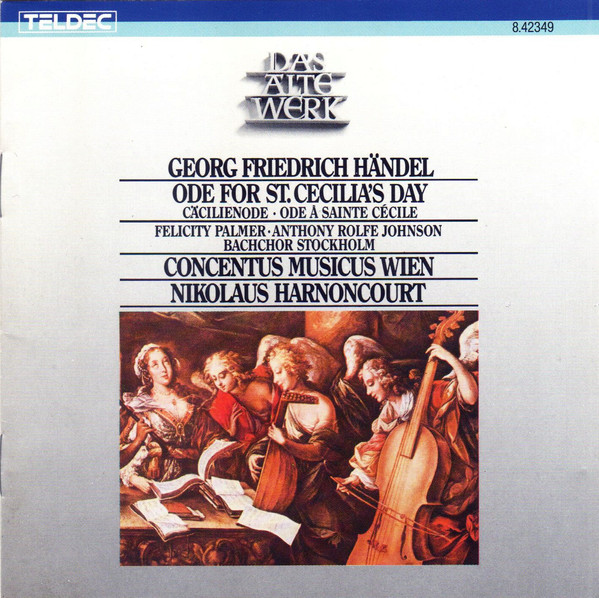 BD: Do you think they would have jumped at the
chance of amplification?
BD: Do you think they would have jumped at the
chance of amplification?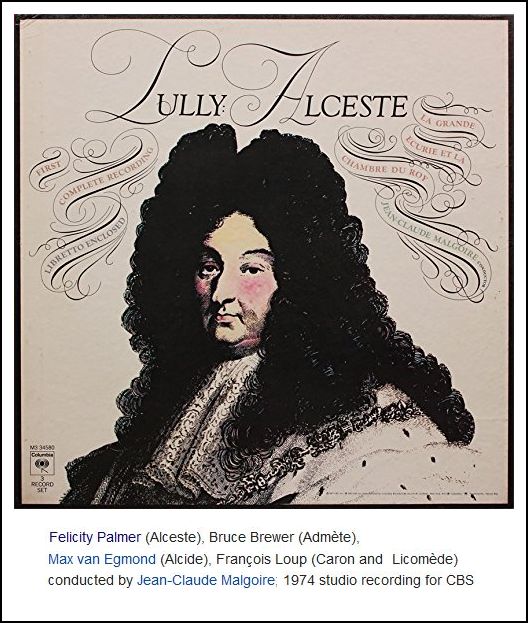 FP: I’ve never played it, but it’s wonderful music.
FP: I’ve never played it, but it’s wonderful music.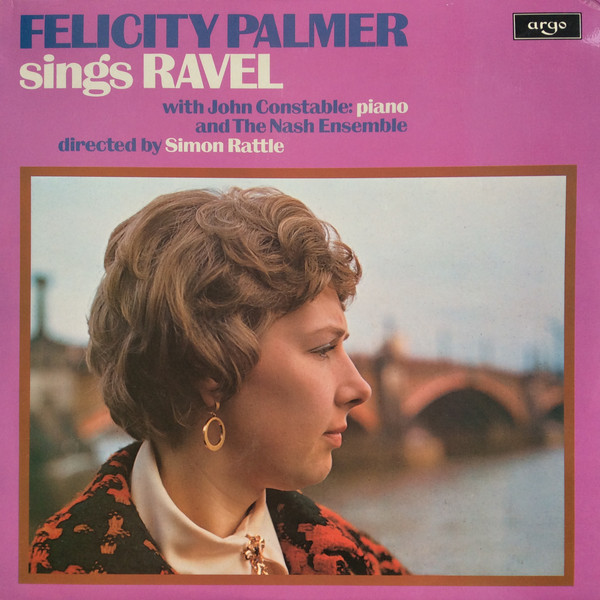 BD: Do you think that this has
bridged the gap, having the subtitles on the television has allowed
even the purists to let it happen in the theater?
BD: Do you think that this has
bridged the gap, having the subtitles on the television has allowed
even the purists to let it happen in the theater?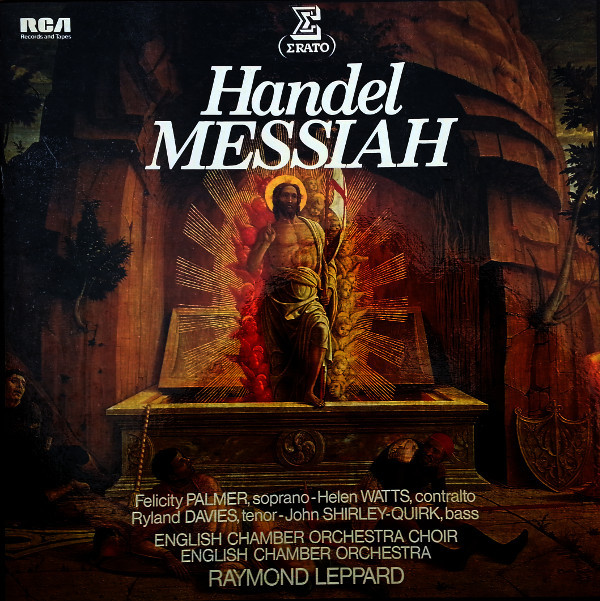 BD: It seems like the opposite
direction since so many mezzos have been trying to push themselves
up just a little bit, and when they can get the High C easily, they
say they’ve become a soprano.
BD: It seems like the opposite
direction since so many mezzos have been trying to push themselves
up just a little bit, and when they can get the High C easily, they
say they’ve become a soprano.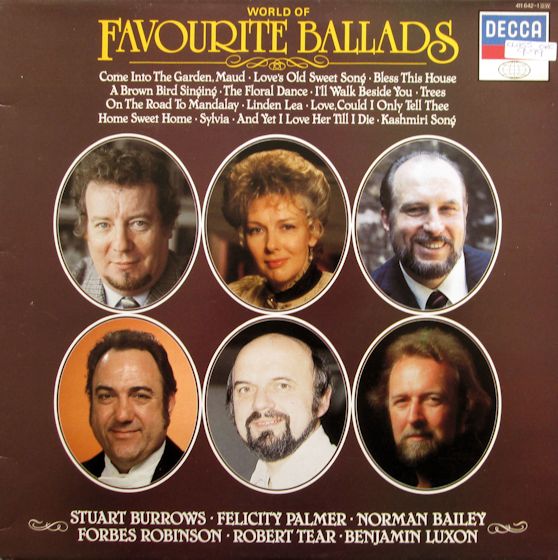 BD: So it’s
sound versus artistry?
BD: So it’s
sound versus artistry?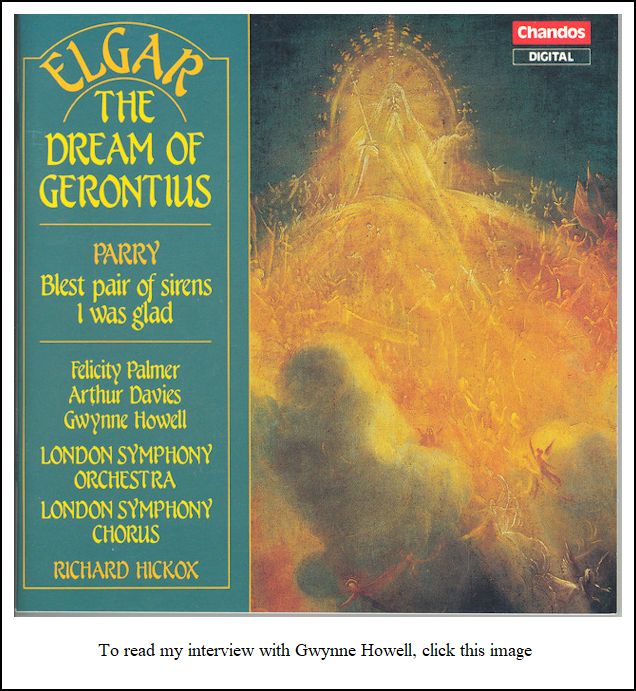 BD: [With a gentle nudge] You don’t want
your children or your friends’ children to be able to enjoy opera?
BD: [With a gentle nudge] You don’t want
your children or your friends’ children to be able to enjoy opera?|
Catley was born in London, and studied at the Guildhall School of Music, where her chief singing teacher was the tenor Walter Hyde. Her other teachers included Sir Granville Bantock, Jenny Hyman and, privately, Julian Kimbell. The school's principal, Sir Landon Ronald, who had been Dame Nellie Melba's accompanist, said Catley reminded him of Melba. She won the Gold Medal, but was prevented from accepting it by her father. She later won it again. In 1937 she sang with Sadler's Wells Opera, as the Queen of the Night in Mozart's The Magic Flute and Nannetta in Verdi's Falstaff. After a successful and sold-out 1938 debut at the Wigmore Hall, which Landon Roland sponsored, she joined the BBC Chorus. She had a successful career, singing with the leading British orchestras. In World War II she sang for a year in Jack Hylton's revue Hi-de-Hi, where she was famed for her performances of Caro nome from Verdi's Rigoletto. She also sang Gilda with the Carl Rosa Opera Company during the war. In 1949 she sang Catherine Glover in a BBC studio broadcast of Bizet's The Fair Maid of Perth, with Richard Lewis as Henry Smith and conducted by Sir Thomas Beecham. She continued singing with the Carl Rosa company till 1957. In 1953 she took part in the first British broadcast of Stravinsky's The Rake's Progress. She often worked with the conductors Stanford Robinson and his brother Eric Robinson, who together account for many of her recordings. She retired to Italy with her cellist husband Allen Ford, with whom she had a son. She returned to Britain to teach. Her students included Judi Dench preparing for a production of Cabaret. |
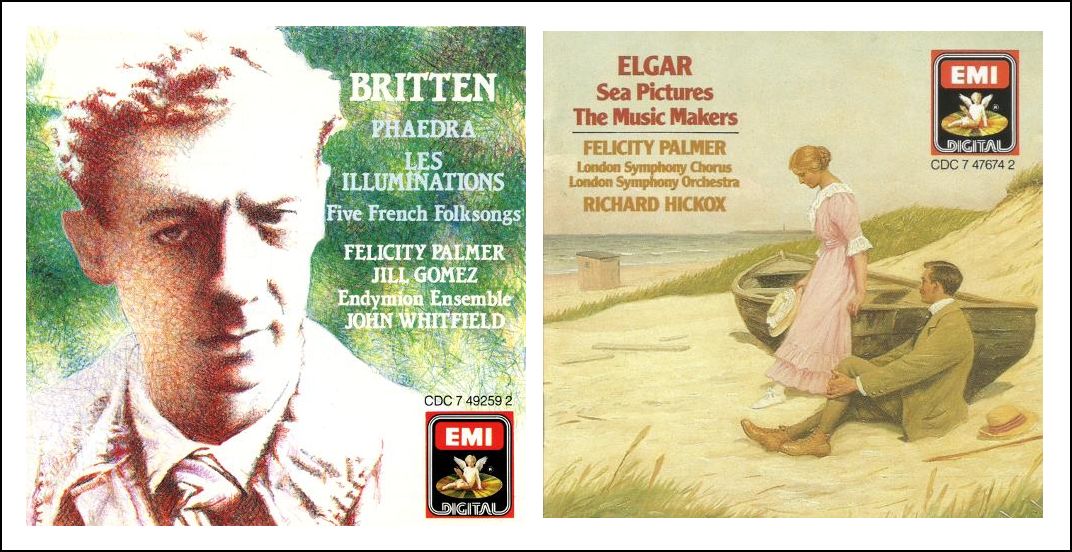
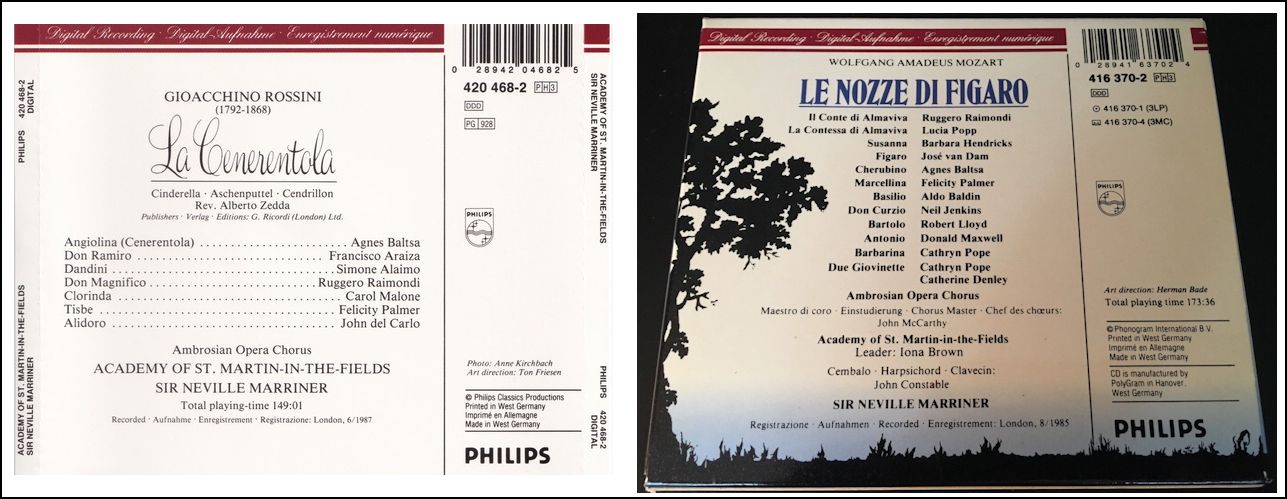
|
Stanislavski's system is a systematic approach to training actors that he developed in the first half of the 20th century. Stanislavski was the first in the West to propose that actor training should involve something more than merely physical and vocal training. His system cultivates what he calls the "art of experiencing" (with which he contrasts the "art of representation"). It mobilizes the actor's conscious thought and will in order to activate other, less-controllable psychological processes — such as emotional experience and subconscious behavior — sympathetically and indirectly. In rehearsal, the actor searches for inner motives to justify action and the definition of what the character seeks to achieve at any given moment (a "task"). Later, Stanislavski further elaborated the system with a more physically grounded rehearsal process that came to be known as the "Method of Physical Action". Minimizing at-the-table discussions, he encouraged an "active analysis", in which the sequence of dramatic situations are improvised. "The best analysis of a play", Stanislavski argued, "is to take action in the given circumstances." Thanks to its promotion and development by acting teachers who were former students, and the many translations of Stanislavski's theoretical writings, his system acquired an unprecedented ability to cross cultural boundaries, and developed a reach dominating debates about acting in the West. Stanislavski’s ideas have become accepted as common sense, so that actors may use them without knowing that they do. Many actors routinely equate his system with the American Method, although the latter's exclusively psychological techniques contrast sharply with the multivariant, holistic and psychophysical approach of the "system", which explores character and action both from the 'inside out' and the 'outside in', and treats the actor's mind and body as parts of a continuum. In response to his characterization work on Argan in Molière's The Imaginary Invalid in 1913, Stanislavski concluded that "a character is sometimes formed psychologically, i.e. from the inner image of the role, but at other times it is discovered through purely external exploration." In fact Stanislavski found that many of his students who were "method acting" were having many mental problems, and instead encouraged his students to shake off the character after rehearsing. |
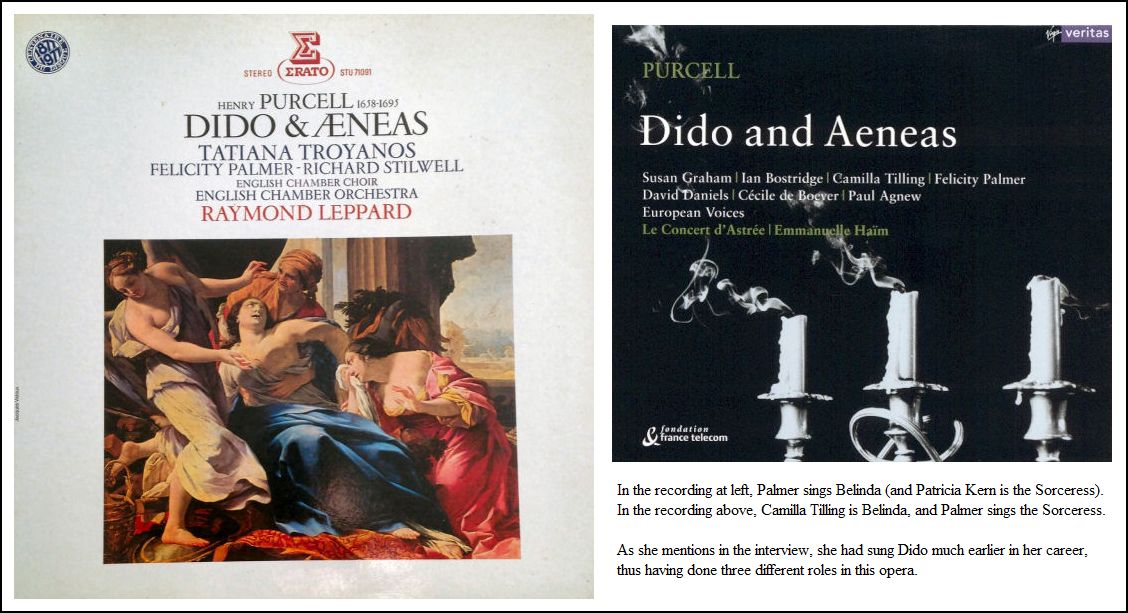
|
Felicity Palmer at Lyric Opera of Chicago
1986-87 - Katya Kabanova (Kabanicha) with
E. Shade, Kunde,
D.Bailey, Jenkins, Wildermann,
Sharon Graham;
Bartoletti, Puecher, Schneider-Siemssen, Schuler
1989-90 - Hamlet (Gertrude) with Milnes, Welting, Kunde; Rudel, Melano, Toms, Schuler 1991-92 - Marriage of Figaro (Marcellina) with Ramey, McLaughlin/J. Hall, Lott, Mentzer/von Stade, Shimell, Loup, Benelli; Davis, P. Hall, Bury, Schuler The Gambler [Prokofiev] (Babushka) with Trussel, Greenawald, Orth; Bartoletti, Ciulei, Boruzescu, Schuler 1994-95 - The Rake’s Progress (Baba the Turk) with Hadley, Swensen, Ramey; D.R. Davies, Vick, Hudson, Schuler 1998-99 - Mahagonny [Weill] (Leocadia Begbick) with Malfitano, Begley, Devlin, Aceto, Nolen; Cambreling, D. Alden, Steinberg, Schuler 2000-01 - Pique Dame (Countess) with Dalayman, Galouzine, Putilin, Skovhus, Maultsby; Davis, Vick, Tallchief, Hudson, Richardson 2006-07 - Dialogues des Carmélites (Mme. de Croissy) with Bayrakdarian, Racette, Kaiser, Travis; Davis, Carson, Levine, Binder |
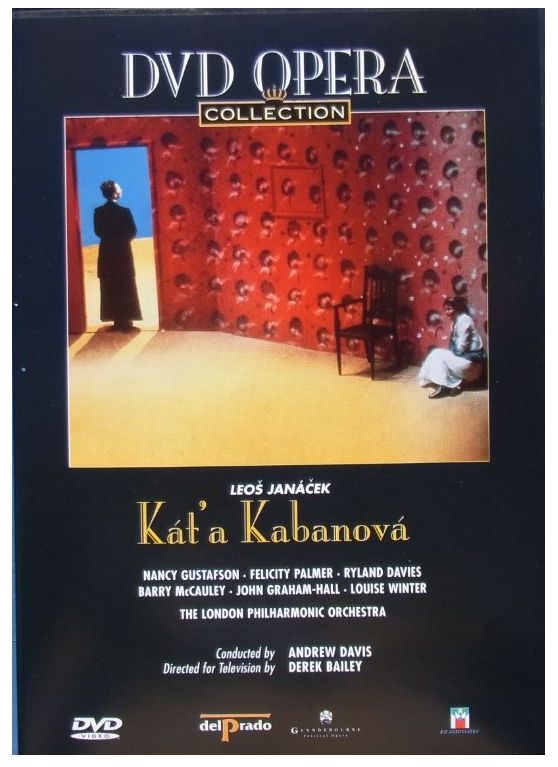 BD: Tell me about Donna Elvira.
You’ve mentioned her several times... [Vis-à-vis
the DVD shown at right, see my interview with Barry McCauley.]
BD: Tell me about Donna Elvira.
You’ve mentioned her several times... [Vis-à-vis
the DVD shown at right, see my interview with Barry McCauley.]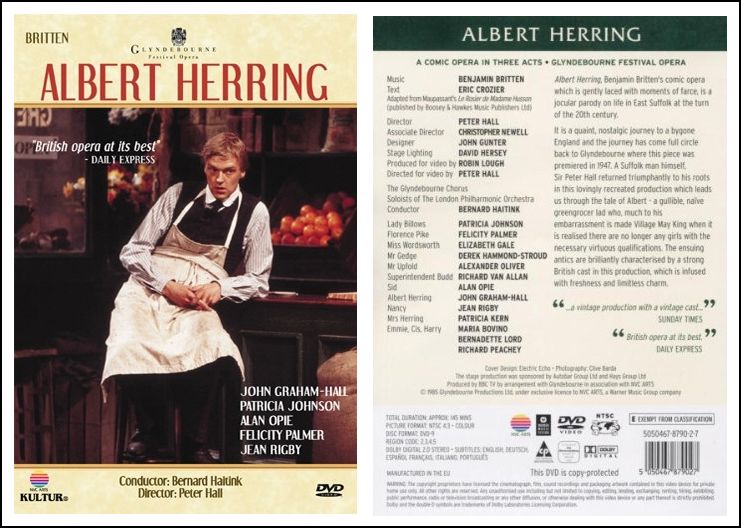 BD: Bartoletti’s real forte is contemporary music.
He’s done a lot of contemporary operas and they are always first-rate.
BD: Bartoletti’s real forte is contemporary music.
He’s done a lot of contemporary operas and they are always first-rate.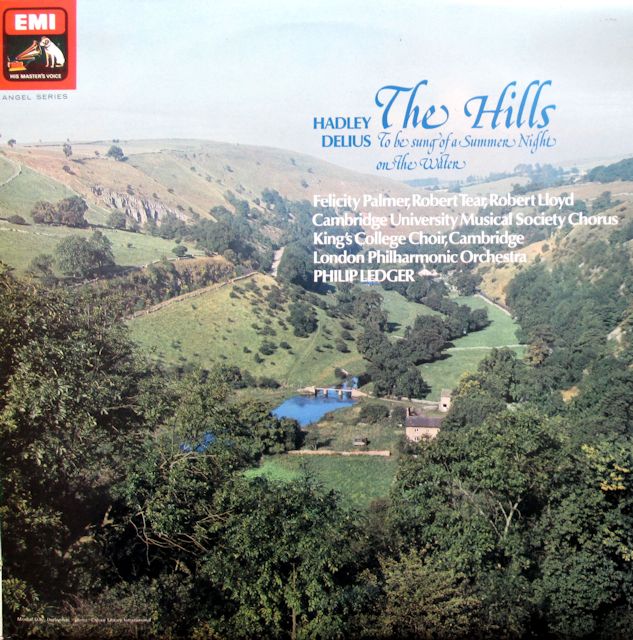 FP: Yes, and it behooves them
to find out what range a bassoon has, for instance. It’s an
insult to write stuff for an orchestra and then have the bassoonist
say that he doesn’t actually have that note on his instrument.
They’re very good musicians. We did a modern composer for a Vienna
Festival years ago. None of us had perfect pitch, and we worked
like crazy on it. Finally, we all went up to the composer and
said, “We’ve done our very best to get it right,
but we found it terribly hard, and we worked for weeks.”
He replied, “Oh, I don’t mind about the notes!
It’s just a general shape I’m after.”
That was very frustrating. We’d been beating our brains out to get
these terrible intervals into our voices, and have it be perfect
and all rhythmically together, and he doesn’t want that at all!
So, I have mixed feelings, and yet I have to say that even when
doing some late Stravinsky, which is fiendish. I’ve done
some of his stuff which is very difficult, and I’ve looked at it
and thought I will never get anywhere near this. There is, for
the performer, a huge sense of achievement that you’ve got to grips
with whatever it is you’re up against. Are we doing it for our
own satisfaction? The public comes and hears it once, and some
of them are astute enough to come perhaps several times, or to come
to rehearsals, and occasionally they’ll say, “It
really was worth that. By the time I heard it three times, I
suddenly realized there was something.”
They have a point, because I’ve done things where I’ve felt it was
just a load of rubbish, and wondering why I am wasting my time doing
this. But then, by the end of five weeks’ worth of it I felt
it’s really got something.
FP: Yes, and it behooves them
to find out what range a bassoon has, for instance. It’s an
insult to write stuff for an orchestra and then have the bassoonist
say that he doesn’t actually have that note on his instrument.
They’re very good musicians. We did a modern composer for a Vienna
Festival years ago. None of us had perfect pitch, and we worked
like crazy on it. Finally, we all went up to the composer and
said, “We’ve done our very best to get it right,
but we found it terribly hard, and we worked for weeks.”
He replied, “Oh, I don’t mind about the notes!
It’s just a general shape I’m after.”
That was very frustrating. We’d been beating our brains out to get
these terrible intervals into our voices, and have it be perfect
and all rhythmically together, and he doesn’t want that at all!
So, I have mixed feelings, and yet I have to say that even when
doing some late Stravinsky, which is fiendish. I’ve done
some of his stuff which is very difficult, and I’ve looked at it
and thought I will never get anywhere near this. There is, for
the performer, a huge sense of achievement that you’ve got to grips
with whatever it is you’re up against. Are we doing it for our
own satisfaction? The public comes and hears it once, and some
of them are astute enough to come perhaps several times, or to come
to rehearsals, and occasionally they’ll say, “It
really was worth that. By the time I heard it three times, I
suddenly realized there was something.”
They have a point, because I’ve done things where I’ve felt it was
just a load of rubbish, and wondering why I am wasting my time doing
this. But then, by the end of five weeks’ worth of it I felt
it’s really got something.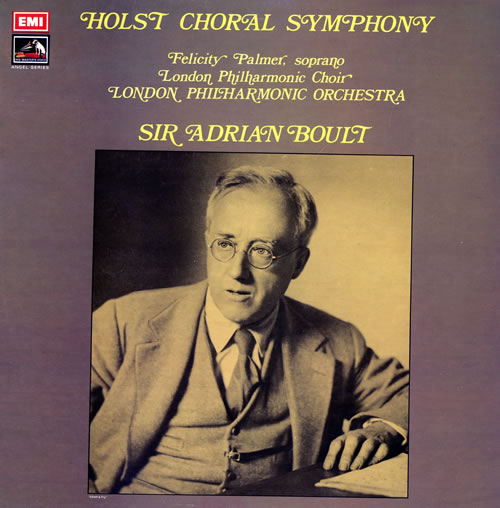 FP: You’re absolutely right.
But then he’s probably going to the wrong thing, unless he chooses
Gilbert & Sullivan, or Offenbach, or Johann Strauss, or...
FP: You’re absolutely right.
But then he’s probably going to the wrong thing, unless he chooses
Gilbert & Sullivan, or Offenbach, or Johann Strauss, or...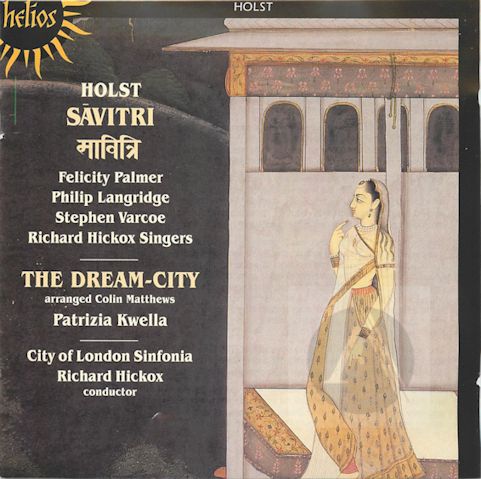 BD: We have 3,600 seats, and most
of the performances are sold out. That’s seven or eight
performances of each opera. Danny Newman is responsible
for the idea of a subscription audience at Lyric Opera.
BD: We have 3,600 seats, and most
of the performances are sold out. That’s seven or eight
performances of each opera. Danny Newman is responsible
for the idea of a subscription audience at Lyric Opera.At this point, we stopped for a moment, and I asked her to record a Station Break.
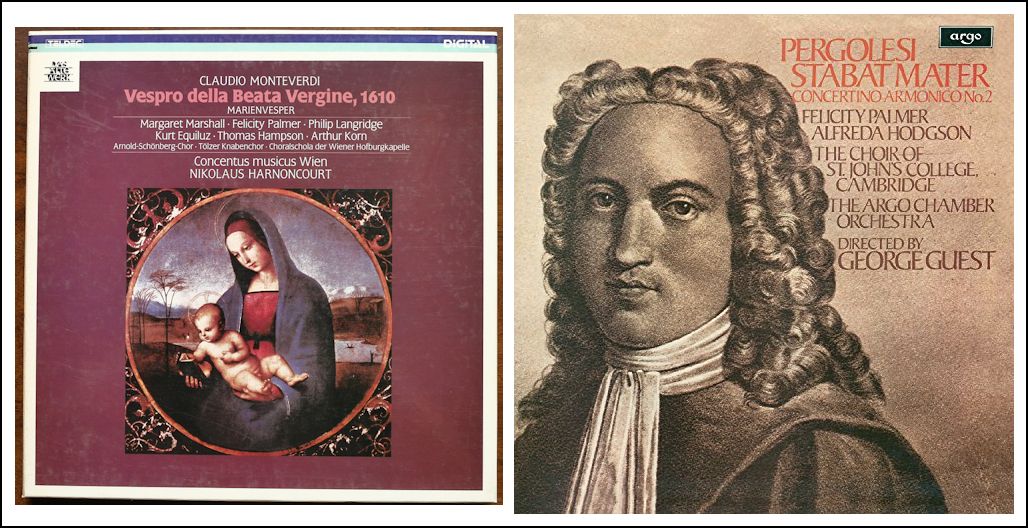
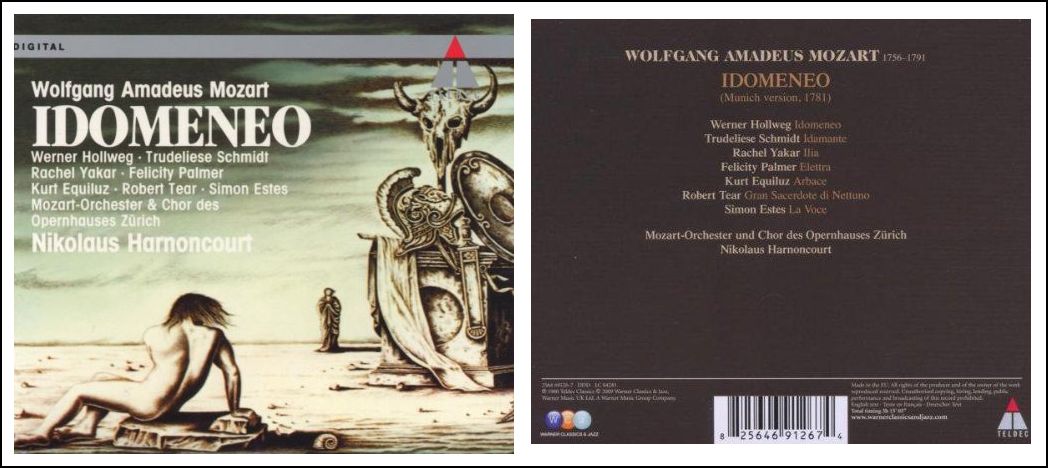
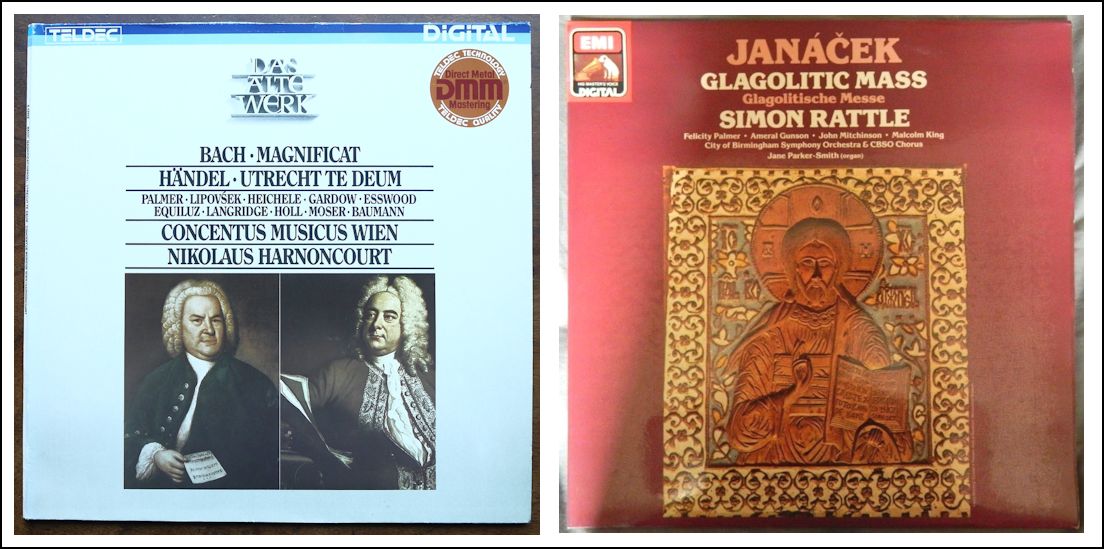
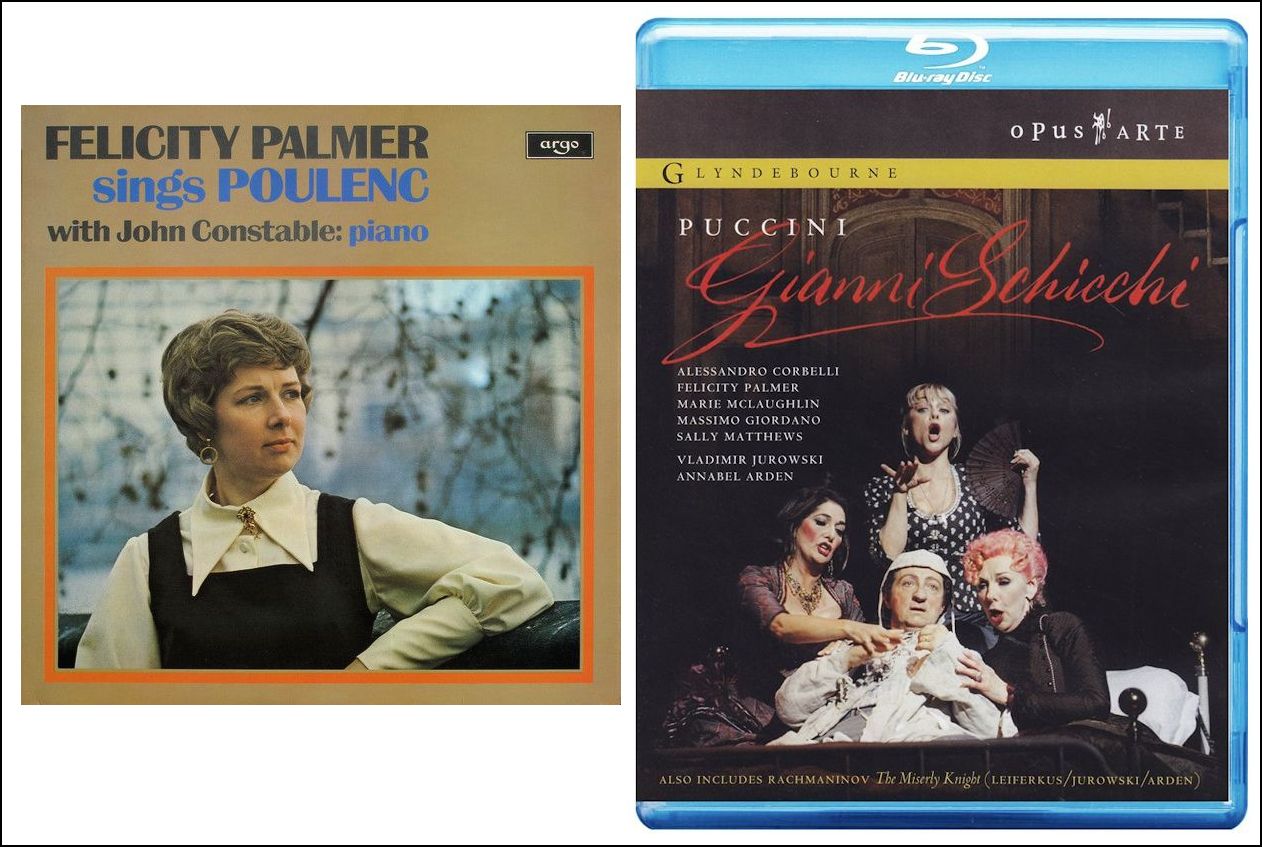
© 1986 Bruce Duffie
This conversation was recorded in Chicago on November 19, 1986. Portions were broadcast on WNIB the following year, and again in 1994 and 1990, and 2000. This transcription was made in 2018, and posted on this website at the beginning of 2019. My thanks to British soprano Una Barry for her help in preparing this website presentation.
To see a full list (with links) of interviews which have been transcribed and posted on this website, click here.
Award - winning broadcaster Bruce Duffie was with WNIB, Classical 97 in Chicago from 1975 until its final moment as a classical station in February of 2001. His interviews have also appeared in various magazines and journals since 1980, and he now continues his broadcast series on WNUR-FM.
You are invited to visit his website for more information about his work, including selected transcripts of other interviews, plus a full list of his guests. He would also like to call your attention to the photos and information about his grandfather, who was a pioneer in the automotive field more than a century ago. You may also send him E-Mail with comments, questions and suggestions.